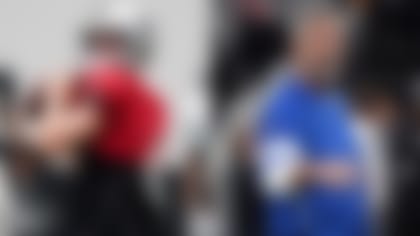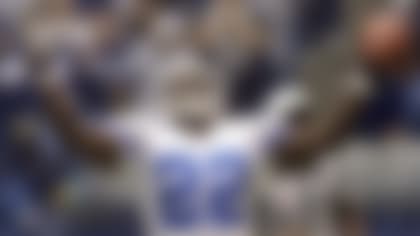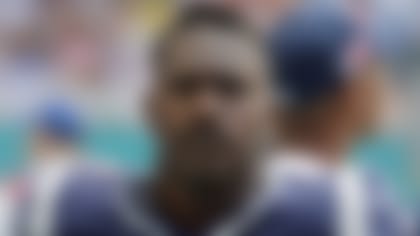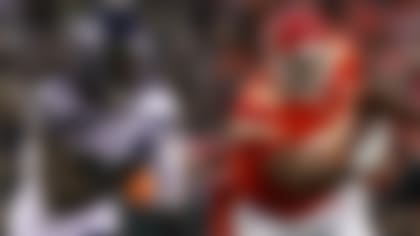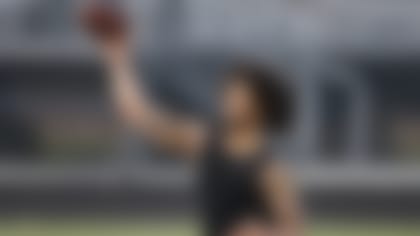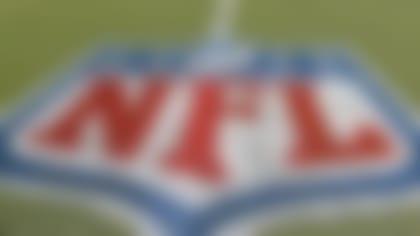In NFL.com's Press Coverage series, columnists Judy Battista, Jeffri Chadiha, Michael Silver and Jim Trotter engage in a back-and-forth discussion on a timely topic, issue or theme. In this edition, JEFFRI CHADIHA leads off a discussion on the NFL's role during a time of great social activism.
This is unquestionably one of the most intense periods in the NFL's history, at least as far as race relations are concerned. What started with the heinous killing of George Floyd in Minneapolis quickly turned into national -- and then global -- outrage. The league once again found itself right in the middle of all this friction, as police brutality was the very issue that first led Colin Kaepernick to start kneeling during the national anthem four years ago. This past week provided even more news on this topic, some stunning and some sobering.
New Orleans Saints quarterback Drew Brees was the first to wade into the controversy. His tone-deaf comments to a Yahoo! Finance interviewer -- Brees said he refused to agree with anyone who would protest in a way that disrespected the American flag -- turned him into an instant pariah. His numerous apologies over the ensuing days seemed to be sufficient for his irate teammates to move forward. Unfortunately for Brees, other parts of the sports world weren't so quick to embrace his contrition.
We'll also see how people respond to the league's own apologies. A collection of star players -- a group that included Chiefs quarterback Patrick Mahomes, Texans quarterback Deshaun Watson and Cowboys running back Ezekiel Elliott -- recorded a video that spoke to police brutality and demanded redress from the league for a lack of support when players protested in 2016 and '17. Within 24 hours, Commissioner Roger Goodell planted himself in front of a camera and offered that very mea culpa.
"We, the National Football League, admit we were wrong for not listening to NFL players earlier, and encourage all to speak out and peacefully protest," Goodell said during the 80-second video clip. "We, the National Football League, believe black lives matter."
There have been players protesting in the streets with fellow citizens. There have been executives, like Colts general manager Chris Ballard and Broncos general manager John Elway, who've talked openly about not standing on the sidelines any longer. Brees also found himself in the midst of another brewing controversy, when President Donald Trump tweeted that Brees shouldn't have apologized and that players shouldn't be kneeling again this fall. Brees responded by telling Trump that "this is not an issue about the American flag. It never has been."
Last week, we used our time in Press Coverage to discuss the importance of prominent white players, specifically franchise quarterbacks, speaking out against police brutality, systemic racism and other forms of social injustice. This time around, we're going to ponder what the near future holds, especially since the likelihood of in-season protests grows larger by the day and Trump is now questioning Goodell's willingness to support those who might kneel. So, Judy Battista, Michael Silver and Jim Trotter, jump in here: Just where exactly is this movement heading?
MICHAEL SILVER: I know we live in an era with rapid-fire news cycles and short attention spans, but I really feel like we've crossed the Rubicon. You're either actively fighting for change, and listening to folks who've endured systemic racism on a relentless basis in American society, or you are the system. And, since the system is undeniably broken, that designation doesn't win you a whole lot of esteem or respect from the people who've been victimized by it. If you live in a bubble -- or in the White House (a.k.a., 1600 Black Lives Matter Plaza NW, thanks to Washington D.C. mayor Muriel Bowser) -- maybe you can exist comfortably in the latter space. In the NFL, not so much.
Until a couple of weeks ago, coaches, general managers, players and league executives could get away with playing things down the middle, acknowledging the right to protest and endorsing the boilerplate notion that racism is bad while affirming their devotion to flag, anthem and country, citing the business-related imperatives of keeping politics out of sports. Those days are over, as Goodell and Brees and Broncos coach Vic Fangio and a whole lot of others are quickly and forcefully learning -- and that message will necessarily resonate all the way to the owner's box.
I don't believe this is a temporary uprising; to me, it feels like the new normal. If you're white and friends/colleagues with a black person, and you aren't listening to that person's perspective, experiences and initiatives toward change, good luck getting the most out of that relationship. This transcends money and authority; if you're on the wrong side of this divide, I don't care who you are. That was the case with Brees, who commendably has pivoted in emphatic fashion, and that will be the case with Patriots coach Bill Belichick, who wrote a letter that then-candidate Donald Trump read at a New Hampshire rally the night before the 2016 presidential election -- a missive that expressed the hope that "tomorrow's election results will give (you) the opportunity to make America great again."
In 2017, when it was reported that Houston Texans owner Bob McNair said of kneeling players in a league meeting among fellow owners and NFL executives, "We can't have the inmates running the prison" -- words the late McNair said were taken out of context in an ensuing statement of apology -- there was a near-insurrection in the locker room, and a real fear that the team would not play the following Sunday's game against the Seattle Seahawks. After a raw and charged meeting with coach Bill O'Brien, who was supportive of their concerns, Texans players ultimately relented.
Three years later, the prospect of widespread player rebellion -- including but not limited to a refusal to take the field should players feel a lack of empathy and support -- doesn't feel far-fetched at all. Put it this way: Had a Saints game been scheduled to take place the day after Brees' Yahoo! Finance interview, there would have been ample social distancing in the New Orleans locker room 15 minutes before kickoff.
JUDY BATTISTA: On Saturday morning, only hours after Roger Goodell's stunning "we were wrong" video and Drew Brees' message to Trump that none of the player protests have ever been about the flag, I got a text from an old friend:
"Was the commissioner's statement as much of a break with ownership as it seems, or have the dynamics within the NFL changed that dramatically?"
That's a pretty good question. I mostly lean toward the latter answer, although I'm sure there are some owners who didn't love Goodell's endorsement of protest. The dynamics of the NFL have changed because the dynamics of everything else have changed. This is not a protest spawning only from within the big cities on the coasts. There are protests in small towns and in rural areas, too. When there are protests demanding change from New York to Vidor, Texas, led by the young people every business watches, when some of the biggest stars in the game are directly demanding action from the league, the NFL had to get on the right side of history and fast.
I expect that, during the next few weeks of the offseason, we'll hear plenty about more big-dollar donations and social justice initiatives, from the league and players and, yes, from Brees, too. Assuming he is as all in as he now appears to be, Brees should be a powerful ally. He has spent years working in the New Orleans community. He has the ears of business and political leaders (maybe not so much the POTUS anymore). He has deep pockets and he has reached into them before -- most recently donating $5 million to the state of Louisiana to help deliver meals to needy people in the midst of the COVID-19 pandemic.
It is the season that fascinates me. Goodell endorsed protest, and I fully expect to see a lot of it. Nothing about the last two weeks has made me think this movement will quietly dissolve -- and I certainly don't expect that to happen in the NFL, particularly because we are already immersed in a divisive presidential campaign cycle. We have already seen the willingness of the president and his acolytes (hi, Ben Carson) to use player protests to whip up his base. On Friday night, Goodell and Brees both drew a line in the sand, indicating a decreased fear of the president's wrath. The NFL probably now faces several long months of being in the political crosshairs. Goodell's message was undoubtedly the right one, but he and the owners have to be prepared to support the players, no matter how ugly the rhetoric gets. They simply can't capitulate as they did a few years ago.
JIM TROTTER: We know the saying: Fool me once, shame on you; fool me twice, shame on me. At the risk of being fooled twice (or would it be for the hundred-millionth time?), I believe this moment is different from four years ago, when players first began publicly yet peacefully and silently protesting systemic racism and police brutality against people of color. I held my breath that the players' words and deeds had stirred the souls of owners, some of whom said they supported the fight. But two years later, these same owners voted to adopt a policy that would prohibit players from on-field demonstrations during the national anthem. That was not progress. That was privilege. And a flex to the players that something of grave importance to them was less important than the bottom line was to owners -- many of whom felt their financial ledger was being hurt by players kneeling during The Star-Spangled Banner.
So here we are, at another flashpoint in history. But this moment feels different, which is why, while this might sound extremely idealistic and naive, I am optimistic that real change is on the horizon -- and that the NFL should be at the forefront of that change.
Baseball might still call itself America's Pastime, but the National Football League surpassed it in power and influence decades ago. Not to overstate the societal impact of sport, but people look to the NFL in times of distress for healing and hope. That's not a hyperbolic statement. It was that way after 9/11 and Hurricane Katrina, and this moment in history should be no different. But that will require intentional engagement from owners, who, whether they accept it or not, are gatekeepers of America's Game. Their teams reach more people each week during the season than just about any other programming in this country, drawing an unrivaled multiracial and multicultural audience. Responsibility comes with that, in my opinion.
To the owners: More is expected of you than taking fans' money, patting them on the back and thanking them for coming. Your players are people and your fans are more than human cash registers. Their pain should be your pain when it involves standing up for American ideals such as equality. Boilerplate statements and big-money donations are not enough. Show that owning a team is not just a business interest you hold. Show that you accept the obligation of being caregivers of the game this country cherishes most.
As Jeff detailed in the intro to this discussion, Commissioner Roger Goodell said last week that the league -- which by extension means each of the 32 owners -- was "wrong for not listening to NFL players earlier, and (now) encourage all to speak out and peacefully protest. We, the National Football League, believe black lives matter." Goodell's job is to not only protect the integrity of the game, but also uphold the interests of the owners, who pay him handsomely. Is that what he did here? Only time -- and the actions of owners -- will tell. It's one thing to admit you were wrong and another to take action to correct that wrong.
If the league really wants to put teeth into the commissioner's statement, those owners who might've shunned Colin Kaepernick should remove the figurative shackles and allow a general manager or coach to sign the quarterback if the person so wishes -- or, at the least, bring him in for an individual workout rather than staging a group circus like what took place in Atlanta last year. That would be more significant than a mea culpa, and show that the NFL is serious about change.
CHADIHA: The key word Jim mentioned is one that I want to focus on here: power. I suspect this situation happening around the country is going to get worse before it gets better, largely because a power struggle is at the foundation of it. For centuries, the police have been a tool used by those in power to establish control (while police unions have grown stronger and widened their political alliances in the process). What we're seeing today, especially within the NFL, is that more people are recognizing how much power they actually possess to change things.
I don't know if the players who made that video knew exactly what kind of impact it would have on the league. It says a lot that Goodell -- who already had been hearing pushback from black leaders inside the league office and media group because of the league's tepid, initial attempt at a statement on May 30 -- was so quick to recognize the need to give them what they wanted. We can argue over the significance of him not uttering Kaepernick's name, but there was a quantifiable action and a definite reaction. Any player in the league who cares about this topic needs to realize that a major door opened at that point, one they should move through with even greater intentions.
This isn't just about asking more of owners, who must decide how much stomach they have for this at a time when their bottom lines likely will be impacted by the presence of COVID-19. It's about asking more of everyone, because we all can help improve this situation. I was encouraged to see teams marching in the streets with other protests. I was just as pleased to hear Brees issue those apologies and then tell Trump exactly what the Saints star quarterback learned: This topic shouldn't be twisted into us versus them. This is only about us, as in all of us.
What was most impactful about the Brees situation is that it involved honest dialogue. Even though he said something that was painful to hear, he tried to make a point about his life experience. Then his teammates clapped back, and he listened to their words. That back and forth concluded with Brees having a better understanding about what was truly happening and also being able to accurately convey that to others who want to demonize this cause.
The important thing that we, as black people, have to understand is that we need to bring compassion and love to this fight along with our anger and outrage. If we want people to side with and help us, we have to be willing to listen and forgive, as well. Brees could've easily tuned out and decided that he didn't need the grief of hearing people castigate him even after he apologized. Instead, he's now part of the game and just as capable of enlightening others.
I've said this many times over the past week, but we have to focus on how we build this relationship going forward. For anybody who's ever been in a relationship, we all realize that nothing gets accomplished if only one side is putting in the work. When it comes to police brutality, black people recognize that the relationship has been too one-sided for far too long, that it's been built on a foundation of abuse and assumptions. To be frank, the relationship has been more like an arranged marriage, with black people often having to accept that police usually occupy our communities while protecting and serving in other places.
This isn't to knock all police. It's to knock the relationship. In fact, I'd encourage all players who plan on protesting this fall to talk with officers when they get the opportunity. Find out what those good cops think and how they feel about police brutality. I recently reached out to a friend who works in a local police department. He was thankful for me checking in and equally pained by George Floyd's death. He also said he's received death threats, solely because he wears the uniform.
I'll stop here by reiterating my fears for the near future. You can already feel Trump probing around, trying to find entry points where he can incite people to side against this movement. He's going to be desperate to win this upcoming election, and division will be his greatest tool. We can't allow him -- or anything else -- to distract from the momentum that is building toward transformative measures.
As I said before, this isn't about one group of people changing. It's about all of us recognizing what we want that change to look like and how we ultimately make it happen.


